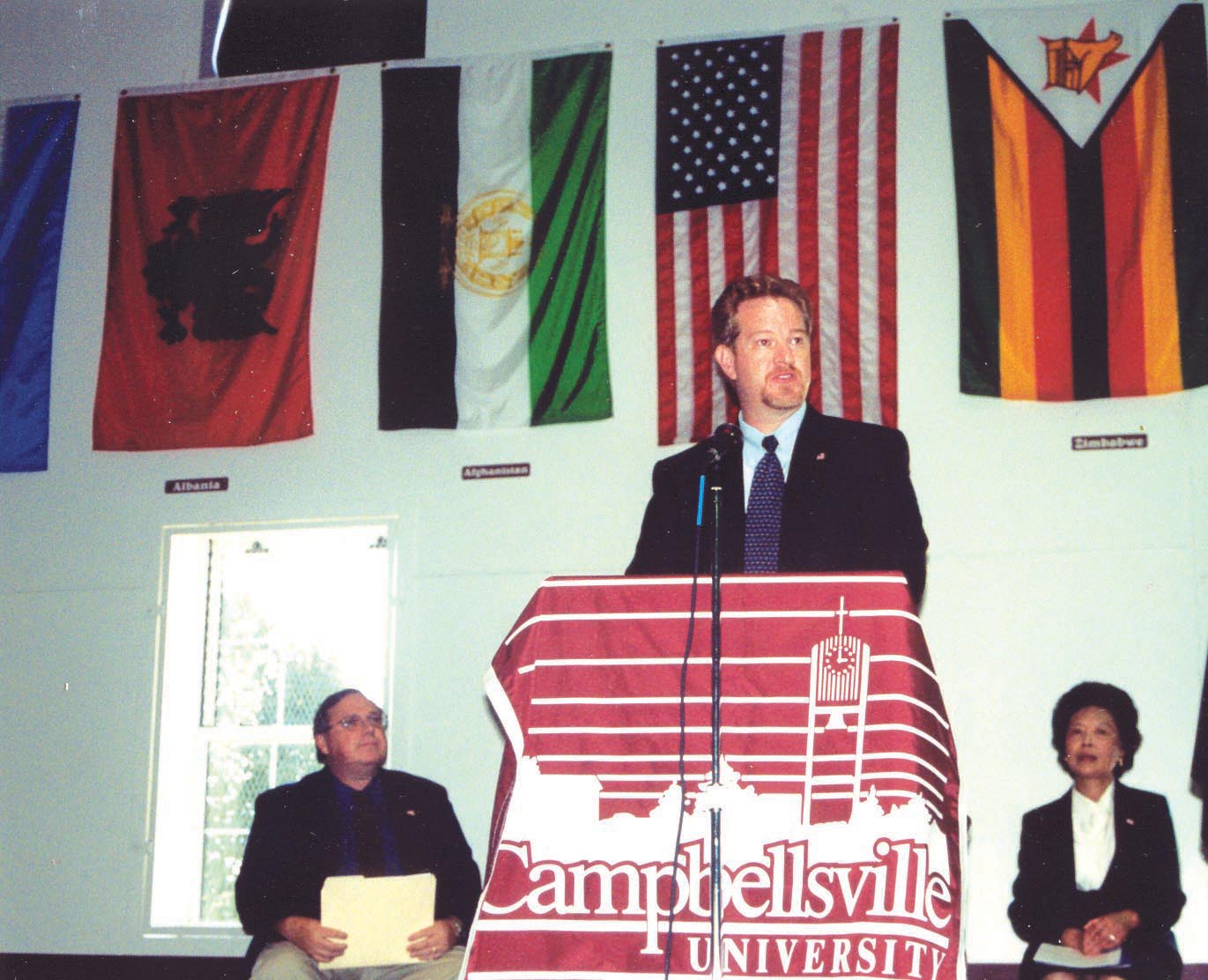
CAMPBELLSVILLE, Ky. (BP)–Campbellsville University President Michael V. Carter took note of the South Korean flag.
To Stan McKinney, assistant professor of journalism at CU, the American flag had given him comfort when he was in Rome.
And Pamela Zhu, professor of education, appreciated seeing the Chinese flag because she was born in the Asian country and now is a United States citizen.
Fifty-six national flags of the homelands from current and former students at the Campbellsville, Ky., campus were dedicated in a “Flags of Nations” ceremony Sept. 11 in the university’s student activities center, where the flags are now on permanent display.
Campbellsville has more than 130 international students enrolled now from 24 countries, said director of admissions Trent Argo. This has jumped from 22 international students from five countries in 1989 when Argo began working in admissions.
Argo, who served in the Air Force in Turkey two years, said he was lonely, felt isolated and did not enjoy the food nor understand the culture when he was there.
“I wondered why God allowed me to experience those feelings and how I would benefit from them,” he said. He’s since found out.
“God has allowed me to be more sensitive and open to other cultures,” he said, as director of admissions and working with international students.
“Campbellsville University’s international population is a result of the efforts of many people, including alumni around the world who have spread the good news of Campbellsville University,” Argo said, noting the value of the Internet in CU’s recruitment of international students.
“We in the United States have so much to learn about other cultures. We don’t have all the answers,” Argo said.
Zhu came to the United States in 1986 as an international student from Shanghai, China. She studied at Indiana University of Pennsylvania six years and started teaching at Campbellsville University in 1992. She became a U.S. citizen in 2000.
Zhu visited New York in July, including a trip to Ground Zero. She called the terrorist attack of Sept. 11, 2001, “not only against individuals but also against the global community.”
She was especially saddened to learn 18 victims of the World Trade Center attacks were from China. “In the aftermath of 9/11, I was fearful, uncertain and enraged. The feeling of security was gone, not just for me or for our nation, but for the world community.”
To “transform this tragedy to triumph,” Zhu said people must assume “the full mantle of world citizenship.”
“We must become active participants, supporters, reformers and creators not just of our government but of all our schools, workplaces and neighborhoods.
“Only through the initiative and involvement of all our citizens can we create an even better place. At the same time that we try and renew democracy at home, we must actively engage with the rest of the world. Americans must engage in an increasingly interdependent world, acting as global citizens and projecting our values.”
She said Americans must “study hard and master all the necessary knowledge and skills in this highly competitive global market” in order to keep the nation in the “leading role of the global economy and technology.”
Zhu said, “Let’s remember: United we stand, divided we fall. America is not only a people. We are a family.”
Vanedson Ximenes, director of CU’s English as a Second Language Institute and associate director of admissions, said in the opening prayer of the flag ceremony that international students have “found love here” at CU.
Carter complimented McKinney on his vision and coordination for the flag display and its reflection of democracy and freedom, recalling a visit to South Korea years ago and appreciating its flag among those in the display.
McKinney explained how the display had materialized from his experiences over the years. “It took the tragic events of Sept. 11 to motivate me to move forward with the project,” he said.
People from 87 nations died on Sept. 11, 2001, he noted. “This country was forged by the hard work of immigrants from many nations,” he said. “This university, indeed most universities, is diverse. Therein lies our strength. Though we are diverse, we are united in a common quest for knowledge, a desire for freedom and faith in God.
“With diversity there must be tolerance and understanding.”
McKinney said it is important “that we learn all we can about each other. It is essential that we learn to tolerate ideas other than our own. We can live up to our national creed — ‘we hold these truths to be self-evident that all men are created equal.'”
He said by working together and finding common ground, there can be “peace through people.”
–30–
(BP) photo posted in the BP Photo Library at https://www.bpnews.net. Photo title: FLAGS FLOWN.
















